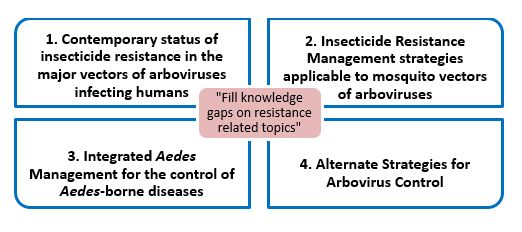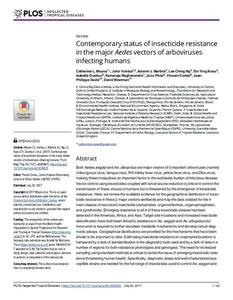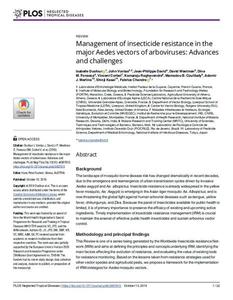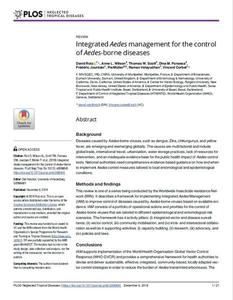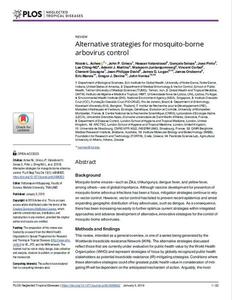Search Results : ""
101 Resultats
Comissioned reviews
Pertinence: 100 %
WHO DD Anopheles & Aedes
Pertinence: 100 %
Determining discriminating concentrations of insecticides for monitoring resistance in mosquitoes: report of a multi-centre laboratory study and WHO expert consultations. World Health Organization. https://apps.who.int/iris/handle/10665/352616....
WHO Training workshop
Pertinence: 100 %
From 18th – 22nd November 2019, The WIN organized the 1st European workshop on for insecticide resistance testing and management in invasive mosquitoes, in IRD, Montpellier France. 19 participants from 15 countries joined the event. The aim of the workshop was to strengthen capacity of European ...
INOVEC
Pertinence: 100 %
A research and innovation partnership for enhancing the surveillance and control of mosquito vectors of emerging arbovirusesLaunched in 2023, the INOVEC project is dedicated to fostering collaborative research and driving innovation to enhance the surveillance and control of mosquito vectors ...
Partners
Pertinence: 100 %
FRANCE (IRD) USA (CDC) ARGENTINA (CIPEIN) BRAZIl (FIOCRUZ) COLOMBIA (Universidad Nacional de Colombia) VENEZUELA (Leslie Alvarez) PERU (NIH) CHILE ((UMCE) ECUADOR (INSPI) PARAGUAY (Universidad Nacional de Asunción) SURINAME (University of Suriname) FRENCH GUIANA (Institut Pasteur de Guyane) URUGUAY ...
Win South America
Pertinence: 100 %
The WINSA: The South American Research Network for the surveillance and control of insecticide resistant arthropod vectors
The WINSA aims to coordinate research actions on insecticide resistance in arthropod vectors in South America and propose adequate mitigation strategies. The WINSA gathers highly qualified research institutions from the 12 South American countries to stimulate exchanges, identify research gaps and priorities, strengthen technical capacity in resistance monitoring and provide support to PAHO and member states to guide decision-making in vector control.
The WINSA aims to contribute to the reduction and elimination of arthropod borne diseases in South America by 2030.
Main objectives
The primary goal of the network is to strengthen the research & training capacities of research / academic institutions in insecticide resistance in arthropods of public health importance in South America. The network will rely on 4 pillars of actions: Networking, Research, Training and Expertise
Networking .
The network will organize annual meetings with partners to share knowledge and ideas and identify gaps to propose coordinated actions for better surveillance and management of Insecticide resistance in the region.
The network will also bring the scientific community, stakeholders and industry to conferences to raise awareness, foster innovation and provide recommendations for the establishment of a regional IR management plan.
Finally the WINSA will advise on the best practice and procedures for implementing adequate monitoring of insecticide resistance in vectors of public health concern.
Research.
The network will review scientific evidence and fill research gaps in vector resistance through the creation of Working Groups. The network will engage in a collaborative manner to raise funds to support collaborative research projects.
Training.
The network will organize basic to expert training courses for researchers, students and staff willing to strengthen their capacities in monitoring insecticide resistance. The members will also develop and promote technical documents and e-materials to ensure transfer of knowledge in the field of resistance.
Finally the network will facilitate the sharing of resources, facilities, biological material among members and support short-term exchanges between partners to stimulate research and innovation.
Expertise.
The network gathers a panel of experts in vector research with the objective to provide countries and PAHO with technical guidance on vector surveillance and control. Experts may contribute jointly to multi-centre trials to develop new methodology for testing new classes of insecticides and assess the efficacy of vector control products.
The network will create a Centralized data repository on vector resistance in South America and produce resistance “threat” maps at national and regional level to guide decision making for insecticide resistance management
Institut Pasteur de la Guyane, French Guyana
Pertinence: 100 %
Created in 1940, The Institut Pasteur de la Guyane is a private, non-profit foundation. As one of the 32 institutes in the Institut Pasteur International Network ( IPIN), its mission is to help prevent and treat diseases, mainly those of infectious origin, through research, teaching, and public ...
Kasetsart University - Department of Entomology, Thailand
Pertinence: 100 %
Kasetsart University (KU), established in 1943, is the most famous university in agriculture science in Thailand. The Department of Entomology, one of members at the Faculty of Agriculture, focuses on insect pest management including agricultural pests but also urban and public health pests. ...
Rutgers University - The Center for Vector Biology, USA
Pertinence: 100 %
The Center for Vector Biology was established within the School of Environmental and Biological Sciences at Rutgers University in 2007 continuing a long and illustrious history rooted in vector biology and control. Rutgers Professor John B. Smith's seminal book on mosquitoes in 1904 heavily ...
School of Public Health - Tehran University of Medical Sciences, Iran
Pertinence: 100 %
The School of Public Health , established in 1965, is the oldest and biggest center for health studies in the Middle East. The School has a long track record of research and training in public health and has long served as the research arm of the Ministry of Health and Medical Education in Iran. ...
Malaria Research and Training Center, Mali
Pertinence: 100 %
The Malaria Research and Training Center (MRTC) of the Faculty of Medicine and Dentistry at the University of Sciences, Techniques and Technologies of Bamako (USTTB), is one of the primary research resources in Africa for malaria epidemiology and control studies as well as vector ecology and ...
U.S. Centers for Diseases Control and Prevention
Pertinence: 100 %
Dr. Audrey Lenhart is a research entomologist and leader of the Integrated Vector Management Team in the Division of Parasitic Diseases and Malaria at CDC’s Center for Global Health in Atlanta. She is currently leading CDC’s international vector-related activities for the Zika response and ...
Swiss Tropical and Public Health Institute
Pertinence: 100 %
The Swiss Tropical and Public Health Institute (Swiss TPH) was founded as a public organisation in 1943 and is an associated institute of the University of Basel. Over 700 members of staff from 62 nations work for Swiss TPH with activities in 90 countries. The institute receives core funding from ...
National Institute of Infectious Diseases
Pertinence: 100 %
The National Institute of Infectious Diseases (NIID) , formerly known as the National Institute of Health (NIH) and established in 1947, is a research institute attached to the Ministry of Health, Labour and Welfare for conducting researches on infectious diseases. The mission of the ...








